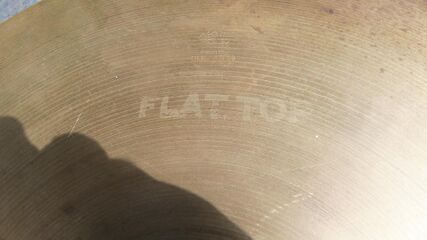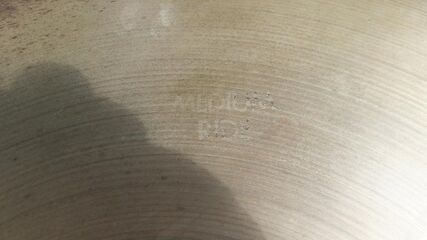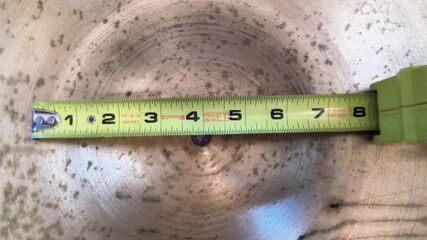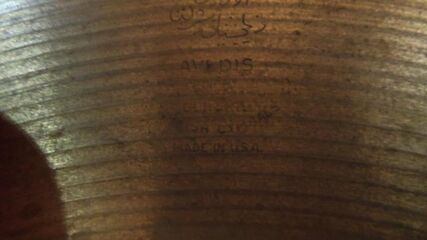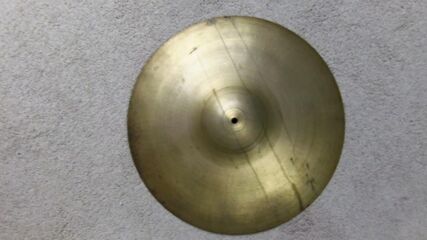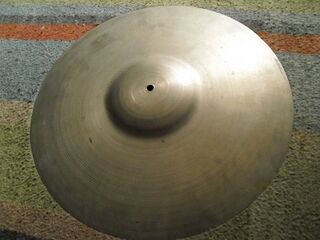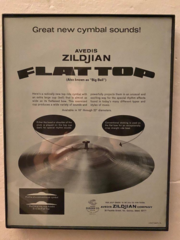Difference between revisions of "Zil Flat Top Cymbal"
m |
m (fie upload driving me crazy taking 10 times as long as it should) |
||
| (14 intermediate revisions by the same user not shown) | |||
| Line 6: | Line 6: | ||
'''Country:''' United States<br> | '''Country:''' United States<br> | ||
'''Group:''' [[Zildjian Types and Models#Ride|Ride]]<br> | '''Group:''' [[Zildjian Types and Models#Ride|Ride]]<br> | ||
| − | |||
'''Size:''' [[Zildjian Flat Top|16"]] [[Zildjian Flat Top|18"]] [[Zildjian Flat Top|20"]] [[Zildjian Flat Top|22"]]<br> | '''Size:''' [[Zildjian Flat Top|16"]] [[Zildjian Flat Top|18"]] [[Zildjian Flat Top|20"]] [[Zildjian Flat Top|22"]]<br> | ||
'''Series:''' [[A_Zildjian|A Zildjian]]<br> | '''Series:''' [[A_Zildjian|A Zildjian]]<br> | ||
| − | '''Weight:''' Medium?<br> | + | '''Weight:''' Medium? 18" weights 1490g, 1650g; 20" weights 2100g, 2417g, 2751g; 22" weights 2997g, 3200g<br> |
| − | '''Used Prices:''' | + | '''Used Prices:''' 18" $79 - 250; 20" $107 - $220; 22" $200 - $250 (all have low sample sizes)<br> |
'''Years of production:''' 1970 for just one year <br> | '''Years of production:''' 1970 for just one year <br> | ||
'''Sound file:''' unknown<br> | '''Sound file:''' unknown<br> | ||
| − | '''Description:''' The Flat Top Cymbal is known by a few nicknames like Cowbell ride and Big Bell. Despite the name it is not a Flat Top Ride. It is a cymbal with a larger than usual diameter bell (7"). The bell is flat on top. The low number of Flat Top Cymbals is because they were only produced for one year.<br> | + | '''Description:''' The Flat Top Cymbal is known by a few nicknames like Cowbell ride and Big Bell. Despite the name it is not a Flat Top Ride or any kind of Flat Ride without a bell. It is a cymbal with a larger than usual diameter bell (around 7"). The bell is flat on top. The low number of Flat Top Cymbals is because they were only produced for one year. It seems they didn't sound all that great and production was halted.<br> |
[[File:z-1970-flat-top-cymbal.png|Flat Top Cymbal]] | [[File:z-1970-flat-top-cymbal.png|Flat Top Cymbal]] | ||
| − | What makes them | + | What makes them useful for research purposes is that all known examples (currently 13) have what we call the 60s stamp. Because of their short duration of production they provide one line of evidence which suggests that |
The so called 60s stamp was still in use in 1970<br> | The so called 60s stamp was still in use in 1970<br> | ||
| Line 23: | Line 22: | ||
Or was in use at the same time as the 60s stamp.<br> | Or was in use at the same time as the 60s stamp.<br> | ||
| − | Here is a 20" example which does have the original model ink saying Flat Top, and it also has Medium Ride ink for good measure. For even better measure there is also a picture of the bell taken from the | + | This model is one of multiple lines of evidence which have shown that the conventional stamp timeline wisdom is half a decade out for the 1960s and 1970s. |
| + | |||
| + | Here is a 20" example which does have the original model ink saying Flat Top, and it also has Medium Ride ink for good measure. For even better measure there is also a picture of the bell taken from the underside which shows the diameter as around 7 inches. | ||
| − | |||
<gallery mode="packed-hover" widths=160px heights=160px> | <gallery mode="packed-hover" widths=160px heights=160px> | ||
| − | File:z-20-flattop- | + | File:z-20-flattop-ink2.jpg|Flat Top Model Ink |
| − | File: | + | File:z-20-flattop-ink.jpg|Medium Ride Ink |
| − | File: | + | File:z-20-flattop-meas.jpg|Bell Measured |
| − | File: | + | File:z-20-flattop-stamp.jpg|60s Trademark Stamp |
| − | File: | + | File:z-20-flattop-top.jpg|Top View |
| + | File:z-20-2100-flat-top.jpg|Side View | ||
| + | File:Z-Flat-top-ad2.png|1970 Ad | ||
</gallery> | </gallery> | ||
| + | |||
| + | In the top view you can also see that from a straight down view it is not easy to spot that the bell is flat on top. This is better done with a view which is slightly side on. The example above is from a different 20" cymbal which weighs 2200g. The next largest bell diameter in use in the 1970s was the Large Cup which is noticeably smaller at 6" diameter and more rounded at 1" tall. The most commonly found use of the Large Cup is on the Rock21 cymbal which came out in 1973. The early Rock cymbals also have 60s stamps, as do the early Pang (1971) and Mini Cup Rides (1971). | ||
Latest revision as of 13:58, 17 October 2022
Company: Avedis Zildjian
Country: United States
Group: Ride
Size: 16" 18" 20" 22"
Series: A Zildjian
Weight: Medium? 18" weights 1490g, 1650g; 20" weights 2100g, 2417g, 2751g; 22" weights 2997g, 3200g
Used Prices: 18" $79 - 250; 20" $107 - $220; 22" $200 - $250 (all have low sample sizes)
Years of production: 1970 for just one year
Sound file: unknown
Description: The Flat Top Cymbal is known by a few nicknames like Cowbell ride and Big Bell. Despite the name it is not a Flat Top Ride or any kind of Flat Ride without a bell. It is a cymbal with a larger than usual diameter bell (around 7"). The bell is flat on top. The low number of Flat Top Cymbals is because they were only produced for one year. It seems they didn't sound all that great and production was halted.
What makes them useful for research purposes is that all known examples (currently 13) have what we call the 60s stamp. Because of their short duration of production they provide one line of evidence which suggests that
The so called 60s stamp was still in use in 1970
The so called 70s stamp didn't come in to use until later in the 1970s
Or was in use at the same time as the 60s stamp.
This model is one of multiple lines of evidence which have shown that the conventional stamp timeline wisdom is half a decade out for the 1960s and 1970s.
Here is a 20" example which does have the original model ink saying Flat Top, and it also has Medium Ride ink for good measure. For even better measure there is also a picture of the bell taken from the underside which shows the diameter as around 7 inches.
In the top view you can also see that from a straight down view it is not easy to spot that the bell is flat on top. This is better done with a view which is slightly side on. The example above is from a different 20" cymbal which weighs 2200g. The next largest bell diameter in use in the 1970s was the Large Cup which is noticeably smaller at 6" diameter and more rounded at 1" tall. The most commonly found use of the Large Cup is on the Rock21 cymbal which came out in 1973. The early Rock cymbals also have 60s stamps, as do the early Pang (1971) and Mini Cup Rides (1971).

